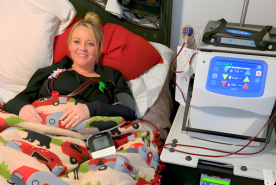March 27, 2020
March 27, 2020, New York, NY—The National Kidney Foundation (NKF) showcased three late-breaking studies to kidney professionals this week during their annual Spring Clinical Meetings, which were held this year as a live-virtual gathering due to the COVID-19 crisis.
· “Apabetalone reduces Cardiovascular Events in Patients with Chronic Kidney Disease, Type 2 Diabetes, and Recent Acute Coronary Syndrome: A BETonMACE trial report” found that patients with acute coronary syndrome (ACS) and type two diabetes (T2D) have a very high risk of subsequent major adverse cardiovascular events or hospitalization. This risk is further augmented by chronic kidney disease (CKD). In patients with CKD, expanded MACE occurred in 12.9% on APB and 25% on placebo (HR 0.48, 95% CI 0.26-0.89 (p= 0.02)
· “Efficacy and safety of oral difelikefalin in stage 3-5 chronic kidney disease patients with moderate-to-severe pruritus: a response analysis from a randomized, placebo-controlled, phase 2 trial” looked at pruritus, a common and burdensome condition in non-dialysis and hemodialysis patients with chronic kidney disease (CKD), for which there are no approved treatments. Difelikefalin (DFK) is a novel peripherally restricted, selective kappa opioid receptor agonist being developed for the treatment of pruritus. The study found oral DFK 1.0 mg daily was the optimal dose based on significant reduction in itch intensity and an acceptable safety profile. Further evaluation of DFK is warranted in CKD patients with pruritus, where there is a high unmet need.
· “Evaluation of Payer Budget Impact Associated with the Use of Artificial Intelligence in vitro Diagnostic, KidneyIntelX, to Modify DKD Progression” studied diabetic kidney disease (DKD), which affects more than 12 million patients in the U.S. Established laboratory tools fail to identify 50% of DKD patients who will have rapid kidney function decline and kidney failure. KidneyIntelX, a biomarker-enriched, clinical feature machine learning, test can predict rapid kidney function decline and kidney failure in DKD stages 1-3b, allowing these highest-risk patients to be promptly and optimally treated to reduce disease progression. The study found that projected base case 5-year savings for 10,000 patients using KidneyIntelX are $115 million; range $83 million–$130 million, most stringent and least stringent definitions, respectively.
“These three studies, taken together, exemplify the multidisciplinary, multistakeholder approach that makes our Spring Clinical Meetings unique,” said Kerry Willis PhD, NKF Chief Scientific Officer. “This diversity in research subjects is what’s needed to improve the outcomes that matter most to people with kidney disease.”
The important studies were chosen from among hundreds of other discoveries presented at the Spring Clinical Meetings. Learn more about the studies and the others presented this week.
The annual gathering of clinicians moved to a live-virtual meeting due to the COVID-19 outbreak. This necessary change will help ensure the safety of our patients, staff, volunteers and conference participants while still enabling NKF to provide the high-quality content SCM is known for in a new live-virtual format.
NKF Spring Clinical Meetings
For the past 28 years, nephrology healthcare professionals from across the country have come to NKF’s Spring Clinical Meetings to learn about the newest developments related to all aspects of nephrology practice; network with colleagues; and present their research findings. The NKF Spring Clinical Meetings are designed for meaningful change in the multidisciplinary healthcare teams’ skills, performance, and patient health outcomes. It is the only conference of its kind that focuses on translating science into practice for the entire healthcare team. This year’s Spring Clinical Meetings will be a Live-Virtual Meeting due to the COVID-19 outbreak.
NKF Professional Membership
Healthcare professionals can join NKF to receive access to tools and resources for both patients and professionals, discounts on professional education, and access to a network of thousands of individuals who treat patients with kidney disease.
Kidney Disease Facts
In the United States, 37 million adults are estimated to have chronic kidney disease—and more than 90 percent are not aware of it. 1 in 3 American adults are at risk for chronic kidney disease. Risk factors for kidney disease include diabetes, high blood pressure, heart disease, obesity and family history. People of African American, Hispanic, Native American, Asian or Pacific Islander descent are at increased risk for developing the disease. African Americans are 3 times more likely than Whites, and Hispanics are nearly 1.5 times more likely than non-Hispanics to develop end-stage renal disease (kidney failure).
The National Kidney Foundation (NKF) is the largest, most comprehensive, and longstanding patient-centric organization dedicated to the awareness, prevention, and treatment of kidney disease in the U.S. For more information about NKF, visit www.kidney.org.









